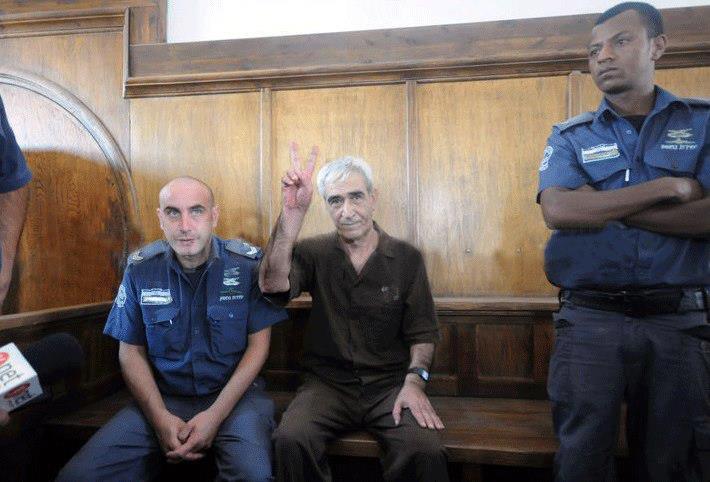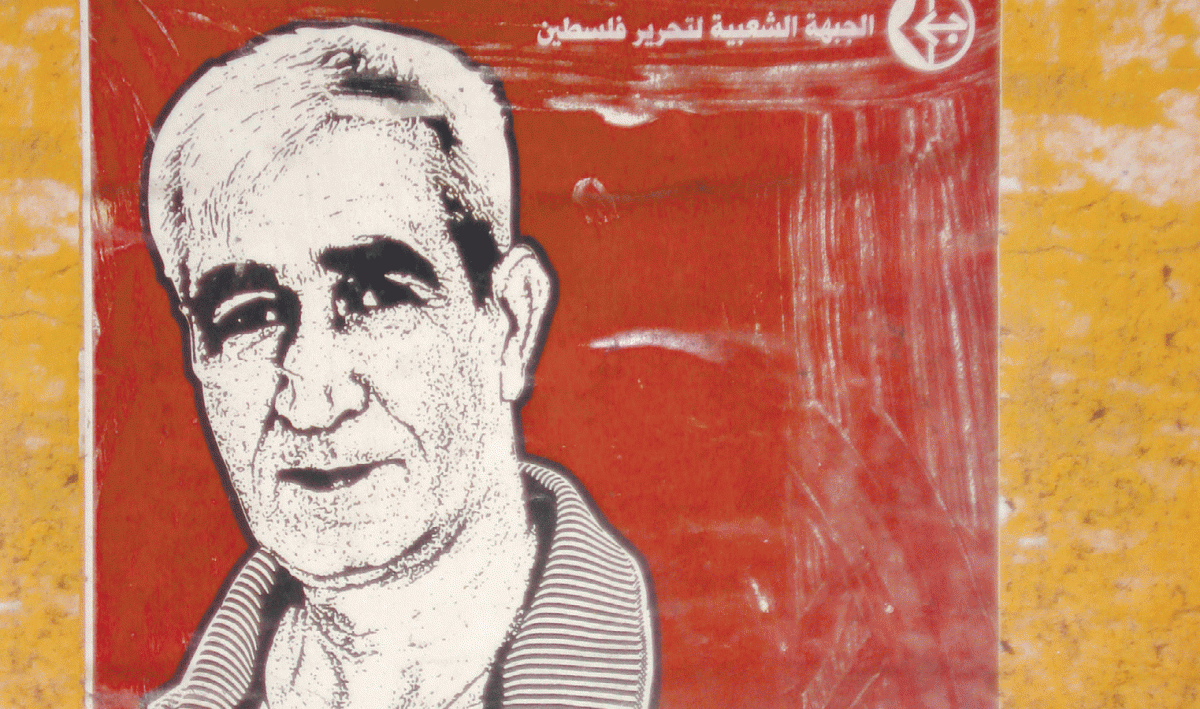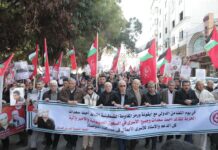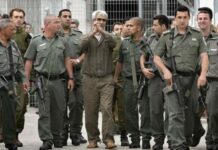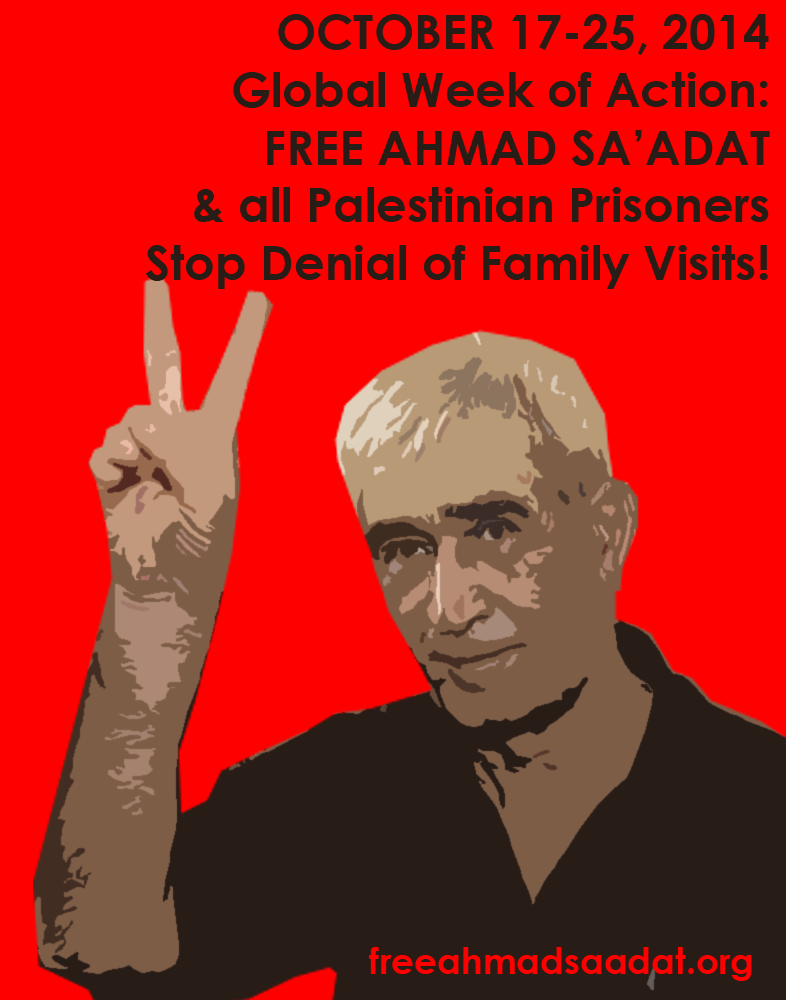 Imprisoned Palestinian national leader Ahmad Sa’adat reiterated his position that he does not recognize the authority of the Israeli occupation courts over Palestinian prisoners at the Magistrate’s Court in Jerusalem on Sunday, September 9, 2012. “I will not recognize the legitimacy of this court which is attempting to perpetuate the occupation of our Palestinian land, and is itself one of the fronts of Zionist terrorism against our Palestinian people, and a tool of repression against Palestinian prisoners,” said Sa’adat.
Imprisoned Palestinian national leader Ahmad Sa’adat reiterated his position that he does not recognize the authority of the Israeli occupation courts over Palestinian prisoners at the Magistrate’s Court in Jerusalem on Sunday, September 9, 2012. “I will not recognize the legitimacy of this court which is attempting to perpetuate the occupation of our Palestinian land, and is itself one of the fronts of Zionist terrorism against our Palestinian people, and a tool of repression against Palestinian prisoners,” said Sa’adat.
Sa’adat was brought to the court for international proceedings in a private lawsuit filed in the United States by Shurat Ha-Din (the Israel Law Center), a Zionist legal organization committed to “lawfare” against Palestinians. This lawsuit seeks to hold all major Palestinian institutions financially accountable for deaths of Israelis who also hold Western nationalities. This lawsuit has earlier sought to bring other Palestinian prisoners and national leaders, including Marwan Barghouthi, to its Jerusalem hearings and compel them to testify.
Sa’adat, the General Secretary of the Popular Front for the Liberation of Palestine, had been held in isolation for over three years, since March 16, 2009 and was returned to the general prisoner population only after the May 2012 agreement that ended the mass hunger strike in occupation prisons. His isolation was one of the major sparks of the earlier September-October 2011 hunger strike, which included hundreds of Palestinian prisoners.
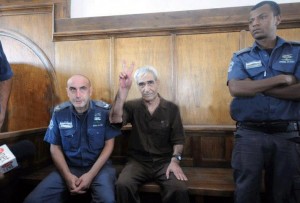 Mahmoud Hassan, director of Addameer’s legal unit, said that the Prison Service Guards transfered Sa’adat from Shata prison to the court against his will, and that Sa’adat continued his rejection – stated multiple times during his own trial – that he did not recognize occupation military courts as a legitimate authority.
Mahmoud Hassan, director of Addameer’s legal unit, said that the Prison Service Guards transfered Sa’adat from Shata prison to the court against his will, and that Sa’adat continued his rejection – stated multiple times during his own trial – that he did not recognize occupation military courts as a legitimate authority.
Sa’adat refused to answer when asked by the judge to state his name or answer any further questions. “I say nothing to this court, as I earlier said nothing to this court, which is known to have my name,” said Sa’adat. The judge asked him about his opinion on the October 2011 prisoner exchange agreement and whether he was frustrated about not being included, to which Sa’adat replied that “the freedom of the homeland is more important and more dear than my personal freedom, which is inevitably coming.”
At the close of the hearing, Sa’adat directed a number of statements to the judge, calling for Israeli and American war criminals to be tried for their crimes against the Palestinian people. He said that the practitioner of terrorism in the region is the occupation, while Palestinians have a just cause and will obtain their rights. “If the United States is so interested in human rights and fact-finding they should carry out their investigations into finding the murderers of American solidarity martyr Rachel Corrie who was killed by the forces of the Occupation, instead of attacking the resistance and calling it ‘Terrorism’…terrorism, is the practice of the Occupation and the forces of Occupation. Resistance is legitimate, will continue, and will grow as long as the occupation exists. I trust the Palestinian people,” said Sa’adat.
Saadat said that “The Palestinian people will continue to resist until freedom, liberation and independence, and the return of all the Palestinian people to their homeland, Palestine. The justice of our cause and the steadfastness of our people and determination strong, is stronger than the occupation, and its mockery of courts and legality, no matter how severe the restrictions on the freedom of our people, freedom is inevitable.”
Sa’adat’s wife, Abla, his son, daughter-in-law and granddaughter came to see him at the court; the Prison Services guards prevented him from touching his granddaughter, Mayar.
Addameer, speaking about the Shurat Ha-Din case, said that “these trials are part of Western and Israeli efforts to criminalize the legitimate resistance to the occupation and label it as ‘terrorism,’ and constitute blatant transgression of international law and the principles of international humanitarian law.”

